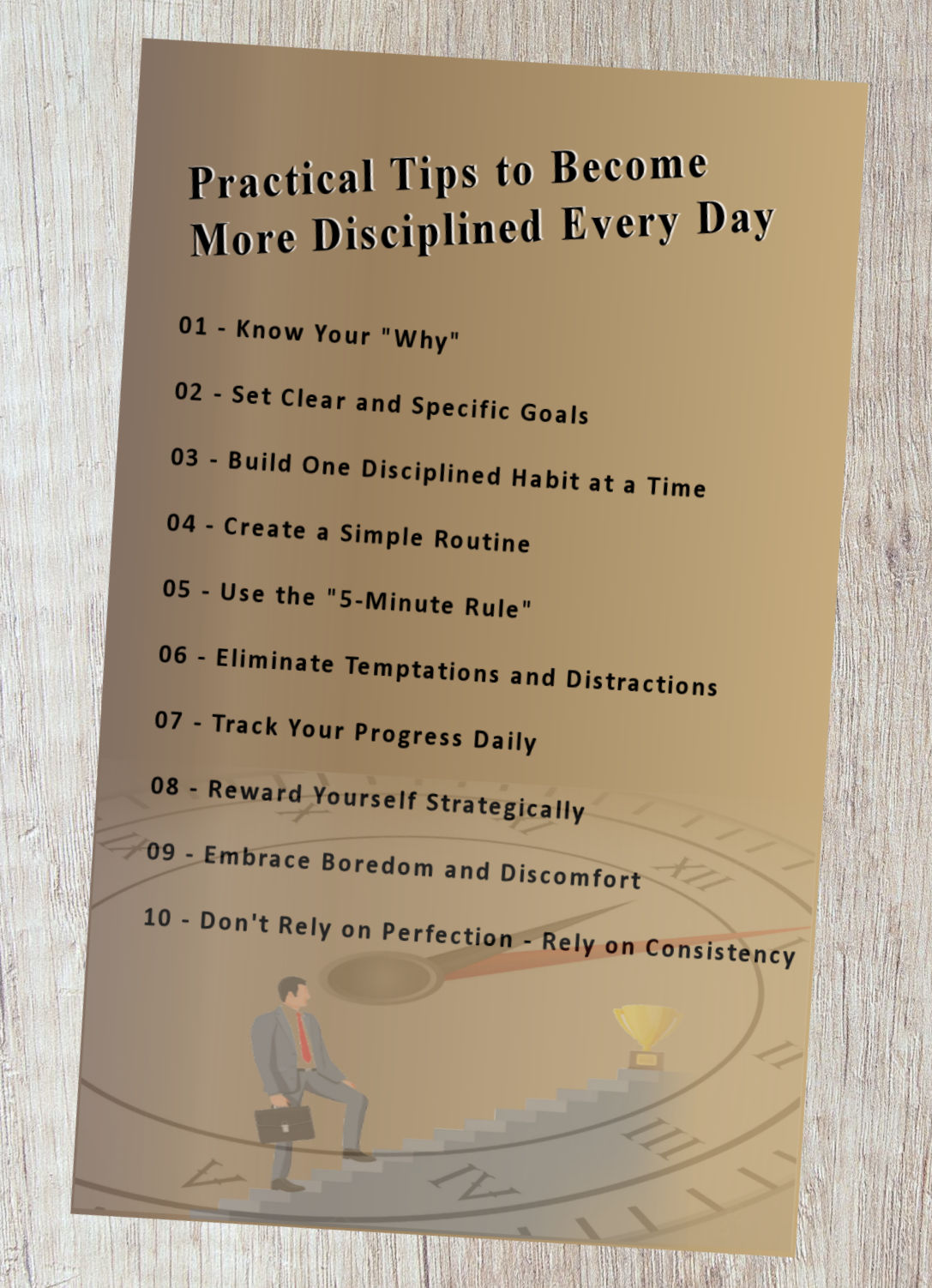Discipline is the bridge between goals and results. It’s not about being harsh with yourself — it’s about making consistent choices that align with your long-term values. While motivation might get you started, discipline is what keeps you going when motivation fades.
The good news? Discipline isn’t something you either have or don’t — it’s a muscle that grows stronger with practice. In this article, you’ll learn practical tips to become more disciplined in your daily life and finally gain control over your habits, time, and progress.
Why Discipline Matters More Than Motivation
Motivation is emotional — it’s tied to how you feel. Discipline is behavioral — it’s tied to what you choose, regardless of mood. That’s why motivated people can still procrastinate, while disciplined people act even when they don’t feel like it.
If you’re serious about personal growth, mastering discipline is a must.
1. Know Your “Why”
Discipline becomes easier when your actions are rooted in purpose. Ask yourself:
- Why does this matter to me?
- How will my life improve if I stay consistent?
- Who else benefits when I show up daily?
Write your “why” down and review it every morning. Purpose gives your discipline direction.
2. Set Clear and Specific Goals
Discipline needs direction. Vague goals like “I want to be better” lead to vague actions. Be specific.
✅ Instead of: “I want to be more productive”
✅ Try: “I’ll write for 45 minutes every morning at 8:00 AM”
Clear goals help you focus your energy, avoid distractions, and track real progress.
3. Build One Discipline Habit at a Time
Don’t try to overhaul your entire life overnight. Start small and build momentum. Choose one habit to focus on for the next 30 days.
Examples:
- Wake up at 6:30 AM every weekday
- Meditate for 5 minutes each morning
- Walk 20 minutes after lunch
- Read 10 pages before bed
Mastering one habit boosts your confidence and lays the foundation for more.
4. Create a Simple Routine
Routines reduce the need for willpower. When something becomes part of your daily flow, it requires less mental effort to do it.
Build routines around your goals:
- Morning routines (writing, movement, planning)
- Workday routines (focus blocks, break times)
- Evening routines (reflection, preparation for tomorrow)
Use alarms, planners, or apps to keep your routine consistent until it becomes automatic.
5. Use the “5-Minute Rule”
Getting started is often the hardest part. Trick your brain by committing to just five minutes.
Tell yourself:
“I only have to do this for five minutes.”
Most of the time, you’ll continue beyond that — but if not, you still practiced discipline. Win-win.
6. Eliminate Temptations and Distractions
Discipline thrives in the right environment. Remove unnecessary friction by making your environment work for you.
Ideas to reduce distractions:
- Keep your phone in another room while working
- Use website blockers (like Freedom or Cold Turkey)
- Organize your workspace
- Use noise-canceling headphones or white noise
You don’t need more willpower — you need fewer distractions.
7. Track Your Progress Daily
Tracking builds awareness and motivates you to stay on track.
Use a simple habit tracker or journal to record your daily actions. Seeing your progress — even in small steps — builds momentum.
You can also use:
- Checklists
- Apps like Habitica, Notion, or Streaks
- Calendar marks (✓ for each day you follow through)
8. Reward Yourself Strategically
Discipline isn’t about punishment — it’s about commitment. Celebrate your wins, no matter how small.
Ideas for self-rewards:
- Watch an episode of your favorite show
- Treat yourself to a favorite snack
- Take a guilt-free break
- Share your win with a friend
Positive reinforcement helps make good habits stick.
9. Embrace Boredom and Discomfort
True discipline means doing the work — even when it’s not exciting. The ability to stay focused during boredom is a major growth edge.
When it gets uncomfortable or dull, remind yourself:
“This is where most people quit. I won’t.”
That mindset builds mental toughness.
10. Don’t Rely on Perfection — Rely on Consistency
You don’t have to be perfect to be disciplined. You just have to keep showing up.
If you miss a day, don’t give up. Restart the next day. Discipline is not about being flawless — it’s about returning.
Bonus Tip: Use Identity-Based Discipline
Shift your thinking from “I need to do this” to “This is who I am.”
Instead of saying:
- “I’m trying to eat healthy”
Say: “I’m the kind of person who fuels my body well.”
This subtle identity shift strengthens your discipline by aligning actions with self-image.
Final Thoughts: Discipline Is a Lifestyle
Discipline isn’t about forcing yourself to live rigidly. It’s about making intentional choices that support the life you want. The more you practice, the more natural it becomes.
Start with small, consistent actions. Celebrate your wins. Stay patient with yourself.
Discipline isn’t a punishment — it’s a powerful gift you give your future self.
